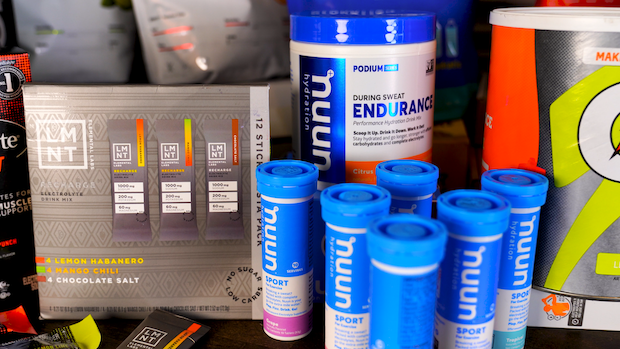The Risks, Harms, and Science of Sugar and Endurance Athletes

Many fitness enthusiasts and health-conscious individuals often wonder whether consuming sugar during exercise is harmful. For some folks, it can be harmful immediately. For most folks, the harm it might cause is a long-term drift. The drift is a slow shifting of how organs operate, all moving towards blood sugar dysregulation, inflammation, or a chronic diseased state. It’s a slow process over the course of months, years, or even decades. Usually, it’s the kind of insidious slow worsening of your health that you only notice once it’s way too late to fully repair the damage. Permanent damage has been done. That sort of thing is worth understanding, and worth understanding really well.
Imagine a scenario where your body stops working normally. Cortisol is through the roof. Your gut isn’t functioning normally. It’s stopped absorbing things comfortably. Your skin is flush. You are breathing audibly louder than normal, and you’re sweating profusely. To get enough to eat, you have to nibble on things all day, because your gut can’t otherwise keep up with your energy expenditure and you’ll starve to death. You’re losing so much water and electrolytes through glands in your skin that you have to be constantly replacing it or risk severe dehydration and death.
Exercise is like no other time, for every organ in your body. Your body and its organs all behave differently during exercise than when you are not exercising. No other activity you do besides physical exercise causes such a dramatic temporary shift in the way every tissue in your body functions.
This article will delve into the topic, exploring the body's mechanisms that come into play during the one specific scenario which tends to change everything about how the body works. It’s a scenario where organs function differently than at any other time in the human experience.
It’s important to push back on ideas that have negative health implications for some people. In this article I’ll explore the relationship between health and sugar consumption during exercise. I will also examine the science of physical activity and how sugar consumption may, in fact, be beneficial rather than harmful. Not just beneficial to performance, but also beneficial to your health. If consuming sugar during exercise can be health-promoting, then the notion that consuming sugar during exercise is universally harmful is not only an oversimplification, but also harmful to many folks’ health.
The Role of GLUT4
To understand the impact of sugar consumption during exercise, it is essential to discuss the role of GLUT4, a transport protein found in muscles and the liver. GLUT4 is mainly dormant in muscles but becomes highly active, or "upregulated," during exercise. Its primary function is to facilitate the transfer of glucose from the bloodstream into working muscles, providing the necessary energy for physical activity.
During exercise, GLUT4 in the liver remains relatively inactive, allowing muscle cells to absorb the available blood sugar. This mechanism ensures that any sugar consumed within reasonable limits is utilized by the muscles, preventing blood sugar fluctuations and inflammation.
The Pancreas and Insulin Production
A key concern regarding high sugar consumption is the potential for long-term pancreatic damage due to increased insulin production. However, during exercise, sugar is absorbed into the muscles more efficiently and rapidly, with much lower blood insulin levels. This means that the pancreas doesn't need to produce nearly as much insulin, reducing the risk of long-term pancreatic damage.
Body Composition and Glycogen Storage
Paradoxically, consuming sugar during and immediately after exercise may actually improve body composition. This is because storing muscle glycogen (the storage form of carbohydrates) in muscles is a fat-burning process. Your body burns fat, to accomplish the physical storage of glycogen. Something has to provide the energy for stringing all the glucose molecules together in muscle cells and that ‘something,’ is fat. So, when you store up glycogen, it’s a fat-burning process. To add to all the good news around glycogen storage, muscles stocked with glycogen tend to build more muscle proteins at rest, which further promotes fat burning and blood sugar reduction.

Performance Enhancement
Ingesting sugar during exercise can also enhance athletic performance, particularly in endurance sports. Consuming carbohydrates in the form of sugar provides a quick energy source, helping to maintain blood glucose levels during prolonged activities. This can help delay fatigue and improve overall performance.
The Meandering Path to Understanding Sugar's Role in Exercise
While it may seem counterintuitive to consume sugar during exercise, a closer look at the body's mechanisms during physical activity reveals a fascinating interplay between sugar, muscles, and the pancreas.
Exercise triggers a series of complex physiological processes that allow the body to adapt and optimize its performance. In this context, sugar consumption can play a vital role in providing the necessary fuel for muscles, ensuring efficient energy utilization and promoting overall well-being.
The Road Less Traveled: Shifting Perceptions on Sugar and Exercise
As we navigate the meandering paths of health and fitness, it's crucial to keep an open mind and sometimes reassess our preconceived notions. The relationship between sugar and exercise is a perfect example of this. While conventional wisdom may dictate that sugar consumption is inherently bad, a deeper understanding of the body's response to exercise reveals a more nuanced and positive picture.
In fact, for many folks, learning to fuel appropriately can be so challenged by the misconception that sugar is unhealthy universally, that it presents a barrier to happily engaging with healthy fitness activities that they might otherwise come to love. It’s not uncommon for newer athletes and exercisers to report fatigue that can stop them from developing an enjoyable exercise habit. The absence of exercise in our lives today is an epidemic of unimaginable proportions. Paradoxically, convincing folks that sugar consumption is okay and even desirable during exercise actually promotes long-term exercise adherence and health.
Future Research Directions
As our understanding of the intricate relationship between sugar consumption and exercise continues to evolve, further research is needed to determine the optimal strategies for different populations and athletic pursuits. Investigating the long-term effects of sugar consumption during exercise and exploring alternative energy sources for athletes could provide valuable insights. Future research may pave the way for more personalized approaches to nutrition and fitness.
A Journey of Discovery
The exploration of sugar consumption during exercise highlights the importance of continually reevaluating our beliefs and understanding the nuances of health and fitness. By embracing a spirit of curiosity and a willingness to challenge conventional wisdom, we might gain improved well-being, enhanced performance, and maybe even have a deeper appreciation of the complexities of the human body during exercise.
While sugar consumption during exercise may have been perceived as harmful in the past, a closer examination of the body's physiological processes reveals that it can be beneficial in certain situations. By understanding these mechanisms and adjusting our approach to sugar intake during exercise, we can harness the advantages and avoid potential negative consequences. The key lies in finding the right balance and making informed decisions that best serve our individual needs and goals.
In Conclusion, A New Perspective on Sugar and Exercise
The notion that consuming sugar during exercise is universally harmful may not be just an oversimplification. It can be harmful to newer exercisers everywhere who could more easily be encouraged to develop exercise habits that they love. They might learn that consuming sugar during exercise would allow them to feel differently, and leave them feeling less fatigued and dysregulated for the rest of the day. By considering the activation of GLUT4, the reduced insulin production by the pancreas, and the benefits of glycogen storage, we can begin to appreciate that sugar consumption during exercise may not only be harmless but also be advantageous in certain circumstances.
As we continue to explore the intricate world of health and fitness, it's essential to approach topics with curiosity and a willingness to challenge prevailing beliefs. In doing so, we can uncover new insights, broaden our understanding, and ultimately, make more informed decisions about our well-being.
Selected Sources
The Role of GLUT4:
–Malin SK, Kirwan JP. Glucose metabolism and exercise: implications for diabetes prevention and treatment. Clin Nutr Res. 2014;3(2):89-96. doi:10.7762/cnr.2014.3.2.89
–Reusch JE, Begum N, Sussman KE, Draznin B. Regulation of GLUT-4 phosphorylation by intracellular calcium in adipocytes. Endocrinology. 1991;129(6):3269-3273. doi:10.1210/endo-129-6-3269
The Pancreas and Insulin Production:
–Karlsson HK, Zierath JR, Kane S. Insulin signaling during exercise. Exerc Sport Sci Rev. 2004;32(2):48-53. doi:10.1097/00003677-200404000-00002
–Colberg SR, Sigal RJ, Yardley JE, et al. Physical activity/exercise and diabetes: a position statement of the American Diabetes Association. Diabetes Care. 2016;39(11):2065-2079. doi:10.2337/dc16-1728
Body Composition and Glycogen Storage:
–Ivy JL, Katz AL, Cutler CL, Sherman WM, Coyle EF. Muscle glycogen synthesis after exercise: effect of time of carbohydrate ingestion. J Appl Physiol. 1988;64(4):1480-1485. doi:10.1152/jappl.1988.64.4.1480
–Volek JS, Kraemer WJ, Bush JA, Incledon T, Boetes M. Testosterone and cortisol in relationship to dietary nutrients and resistance exercise. J Appl Physiol. 1997;82(1):49-54. doi:10.1152/jappl.1997.82.1.49
Performance Enhancement:
–Burke LM, Hawley JA, Wong SH, Jeukendrup AE. Carbohydrates for training and competition. J Sports Sci. 2011;29 Suppl 1(Suppl 1):S17-S27. doi:10.1080/02640414.2011.585473
–Currell K, Jeukendrup AE. Superior endurance performance with ingestion of multiple transportable carbohydrates. Med Sci Sports Exerc. 2008;40(2):275-281. doi:10.1249/mss.0b013e31815adf19
Hydration and Electrolyte Balance:
–Casa DJ, Armstrong LE, Hillman SK, et al. National Athletic Trainers' Association position statement: fluid replacement for athletes. J Athl Train. 2000;35(2):212-224.
–Sawka MN, Burke LM, Eichner ER, Maughan RJ, Montain SJ, Stachenfeld NS. American College of Sports Medicine position stand. Exercise and fluid replacement. Med Sci Sports Exerc. 2007;39(2):377-390. doi:10.1249/mss.0b013e31802ca597







Start the discussion at forum.slowtwitch.com